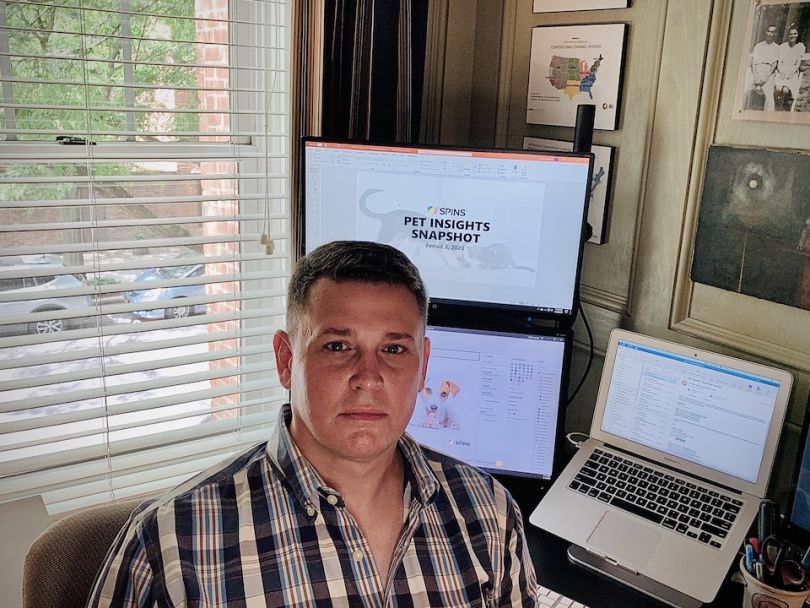
As of March 27, more than 16 million knowledge workers started working remotely due to the coronavirus, according to a report from Slack. But even before the pandemic, the number of employees working from home has grown by over 90 percent in the last decade, according to a study by remote work job board FlexJobs.
More people than ever are working remotely full- or part-time, but many individuals are still getting adjusted to a new kind of professional life. As they adapt to the nuances of working from home — like potentially having a better work-life balance but experiencing increased loneliness — many employees may be wondering how veteran WFH-ers have been doing it consistently for years.
We asked some. Their words of wisdom for new remote professionals? Build a routine and stick to it.

Keeping energy levels high during a day full of virtual meetings can be a challenge, even for more experienced remote workers. Emily Doyle experiences this as campus director of Flatiron School, a software engineering institution. She said she maintains focus by deliberately keeping parts of her calendar free of meetings altogether.
How long have you worked remotely, and what drew you to this type of role?
I’ve been at Flatiron School for nearly four years. During that time, I’ve held a number of jobs, some of which have been remote. I loved getting the opportunity to work remotely after moving to Chicago a couple of years into my time at the company. Although the current circumstances around working from home are a little different, I've embraced the flexibility and comfort of remote work, both now and in past roles.
It takes a different kind of energy to be completely present online.”
What’s the one thing you do every day that has the biggest impact on your work as a remote employee?
Most mornings, my fiancé and I do a daily household standup while we drink coffee and eat breakfast. We each talk through three things we’re grateful for and three goals that we have for the day. It helps me start my day with positivity and allows me to ground myself in what needs to be done.
What’s the most important lesson you've learned about remote work throughout your experiences?
Being wholly attentive on video calls is a muscle. Between navigating inevitable technical difficulties and doing one’s best to pick up on physical and tone cues from colleagues, it takes a different kind of energy to be completely present online. If most of a person’s work is done in meetings, they may find themselves feeling exhausted by a day that may ordinarily have been energizing. And it can take some time to build up that muscle. I found it helpful to be intentional about taking breaks and building blocks of time on my calendar to not be in meetings.

Following a daily routine has allowed Jeff Crumpton to make remote life work for him at SPINS after almost a decade with the company. The retail reporting solutions manager said his routine at the wellness-focused food data company allows him to organize his day so that he has time to volunteer in his community.
How long have you worked remotely, and what drew you to this type of role?
I’ve been a remote employee for my almost nine-year tenure at SPINS. Originally, I was brought on to be a retail on-site analyst for one of our retail partners in Westchester County, NY; this position allowed me to move into other roles.
I can attribute my motivation for going remote to my spouse. For anyone that knows the rigors of landing a tenure-track position at a top college, our choice of where to live was static. And my location has never been a professional barrier for me. SPINS has provided me with a career path that never limited my advancement because I was remote.
Routine provides the structure that I need to be able to accomplish all my tasks.”
What’s the one thing you do every day that has the biggest impact on your work as a remote employee?
Whether it’s walking my dog through the park in the morning, carving time out to go to the gym over lunch, or logging off at the end of the day, my routine is the same every workday. That routine provides the structure that I need to be able to accomplish all my tasks.
It has even helped me to be more involved in my community. I can devote the time that I might have spent commuting to and from the office each day to volunteer and support community causes.
What’s the most important lesson you’ve learned about remote work throughout your experiences?
There is a sort of an unspoken contract between remote employees and the companies for which they work. On the company side, there is the promise of growth, engagement and advancement within an employee’s current or future skillset. That promise is predicated on an employee’s willingness to ask for those opportunities. And most importantly, it’s based on them showing up each day and delivering on their side of the promise; there can’t be one without the other.
Remote employees need to seek out ways to stay connected with their team. One might assume that being remote would have an isolating effect, but in my experience, it has been the opposite: I have become more engaged with my colleagues.




